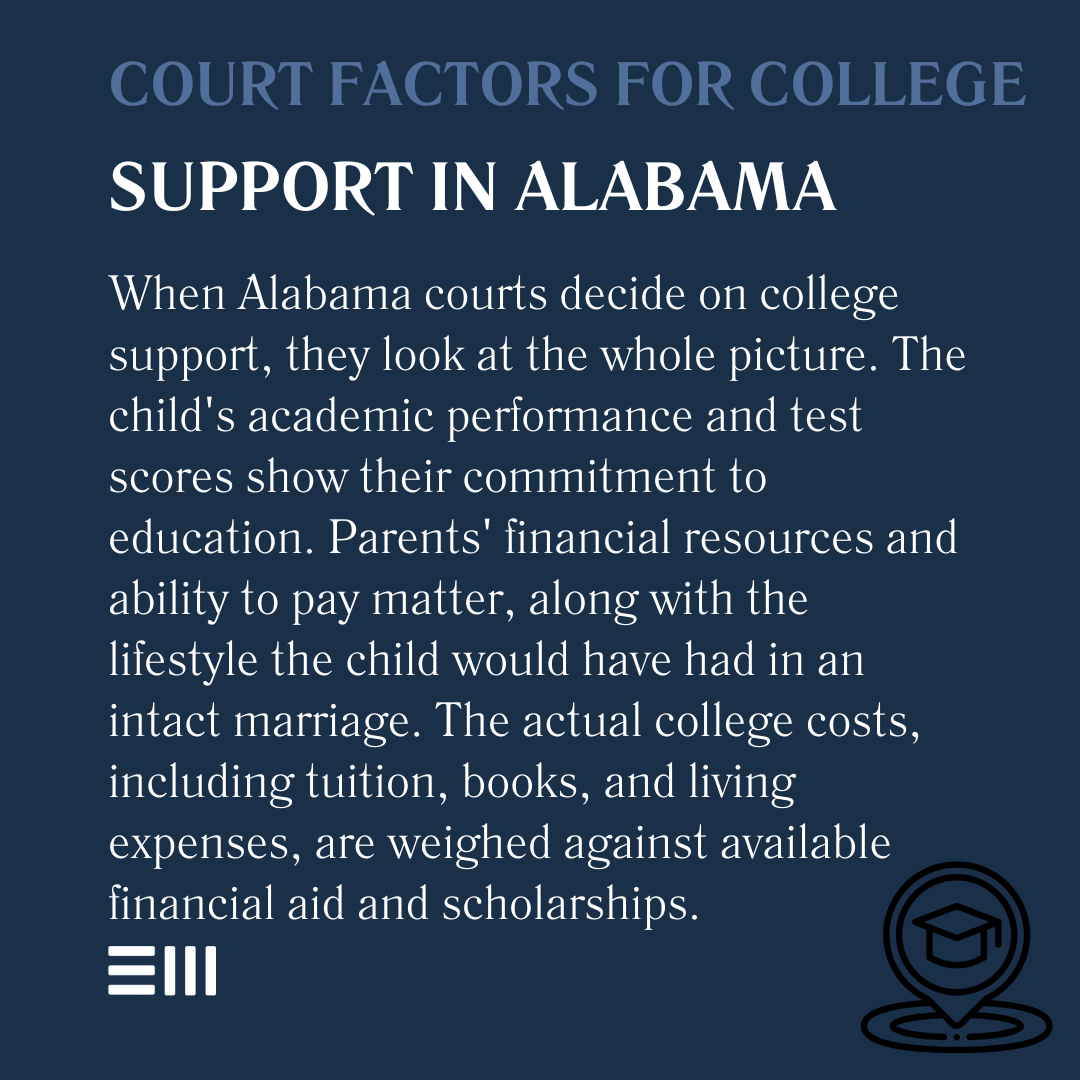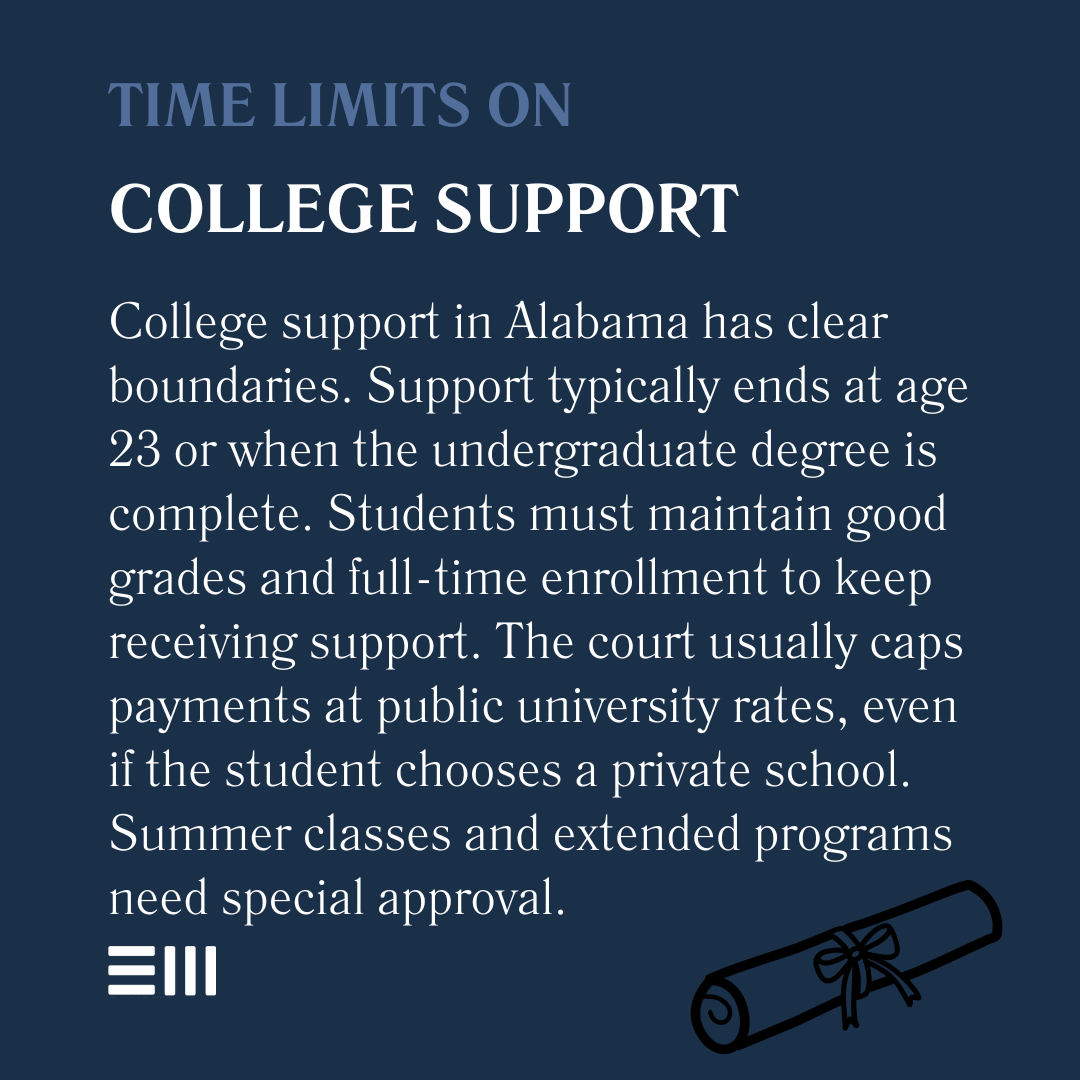The acceptance letter arrives in the mail—a moment of pride quickly followed by uncertainty for divorced parents in Alabama.
While their child celebrates this milestone, parents often wrestle with complex questions about financial responsibility for college expenses.
Between tuition increases, housing costs, and academic fees, the path forward can seem overwhelming.
Alabama's unique approach to college support after divorce creates both opportunities and challenges for families navigating this transition.
Understanding your rights and obligations under state law can make the difference between a smooth college experience and years of legal conflict.
Understanding Post-Minority Support in Alabama
Before diving into specific requirements, it's important to understand that Alabama treats college support differently from basic child support.
While Rule 32 Alabama Child Support Guidelines govern standard child support calculations for minors, college support follows different legal principles.
These guidelines, which calculate regular child support based on parents' incomes and custody arrangements, don't directly apply to college expenses.
Instead, post-minority support reflects Alabama's recognition that a child's need for parental support doesn't automatically end at age 19.
- Alabama courts established post-minority support through the landmark case Ex parte Bayliss, though this was later modified by legislation in 2019, significantly changing how courts approach college support;
- Parents must specifically address college expenses in their divorce agreement, or the court must order it before the child reaches age 19, making timing critical in these cases;
- Unlike basic child support, post-minority support isn't automatically guaranteed and requires meeting specific criteria established by Alabama courts;
- The 2019 legislative changes emphasize parental autonomy in decision-making while still protecting children's educational interests;
- Courts consider the historical precedent of family educational achievement when evaluating college support requests; and
- Both parents typically share the responsibility for providing documentation and financial information to support their positions.
The evolution of post-minority support reflects Alabama's commitment to supporting higher education while balancing parental rights and responsibilities.
Factors Courts Consider When Ordering College Support
Alabama courts carefully weigh multiple elements when determining whether to order college support and how to structure these payments.
This comprehensive evaluation ensures fair treatment for all parties involved.
- The child's academic ability and commitment to education, including high school performance and standardized test scores, with particular attention to their potential for college success;
- The parents' combined financial resources and ability to contribute without undue hardship, including current income, assets, and other financial obligations;
- The standard of living the child would have enjoyed if the parents had remained married, considering historical family spending patterns and educational priorities;
- The actual costs of attendance at the chosen institution, including tuition, books, and reasonable living expenses, with detailed breakdowns required;
- Any scholarships, grants, or other financial aid the student receives, including both merit-based and need-based assistance;
- The availability of educational loans and their impact on the family's overall financial picture;
- The child's relationship with both parents and their level of cooperation in educational planning;
- Historical patterns of college attendance within the family;
- The potential impact on other siblings' educational opportunities; and
- The feasibility of the child contributing through part-time work or other means.
Each case receives individual consideration based on these and other relevant factors unique to the family's situation. Courts strive to balance educational opportunities with financial realities.
Limitations and Duration of College Support
Understanding the boundaries of college support obligations helps parents plan effectively and avoid future disputes.
- Support typically continues until the child reaches age 23 or completes their undergraduate degree, whichever comes first;
- The court may require the student to maintain a minimum GPA and full-time enrollment status to continue receiving support;
- Support can be modified or terminated if circumstances change significantly, such as academic performance issues or parental financial hardship;
- Parents aren't typically required to pay for graduate or professional school unless specifically agreed upon in the divorce settlement;
- Courts may cap contributions based on in-state public university costs, even if the child chooses a more expensive institution;
- Summer sessions and additional semesters beyond four years usually require separate consideration;
- Support may be suspended during periods when the student isn't actively enrolled;
- Changes in the child's living situation (on-campus vs. off-campus) might affect support calculations;
- Educational expenses must be properly documented and verified; and
- Parents may be required to communicate directly with the educational institution regarding payments.
These limitations help ensure fairness while promoting educational achievement and responsible use of resources.
The Application Process for College Support
Successfully pursuing college support requires careful preparation and documentation.
Understanding the process helps ensure the best possible outcome.
- File a petition before the child turns 19, allowing sufficient time for court consideration;
- Gather detailed financial information from both parents, including tax returns, pay stubs, and asset documentation;
- Document the child's academic performance and college acceptance letters from all schools under consideration;
- Prepare estimated costs for the chosen institution, including detailed breakdowns of expenses;
- Include information about available financial aid and scholarships, showing efforts to minimize parental burden;
- Provide evidence of the child's relationship with both parents;
- Submit documentation of any special circumstances or needs;
- Include historical information about family educational patterns;
- Present a realistic budget for college-related expenses; and
- Demonstrate the child's commitment to their education through academic and extracurricular achievements.
Thorough documentation strengthens your position and helps the court make an informed decision that serves the best interests of all parties involved.
Frequently Asked Questions About College Support in Alabama
Parents often have specific questions about how college support works in Alabama.
Here are answers to common concerns.
How Does Remarriage Affect College Support Obligations?
A parent's remarriage typically doesn't eliminate their college support obligations, though it may affect their overall financial picture. Courts consider the total household income but focus primarily on the biological parents' resources.
What Expenses Does College Support Usually Cover?
College support generally includes tuition, required fees, books, and reasonable living expenses like room and board. Additional expenses such as transportation, computer equipment, and study materials may also be included based on the court's discretion.
Can a Parent Be Required to Pay for Private College?
While courts can order private college support, they often limit contributions to the equivalent cost of attending a state university. Parents can agree to higher amounts through mutual consent.
What Happens if the Paying Parent Loses Their Job?
Parents can petition for modification if they experience significant financial changes, but they must show the change is substantial and ongoing. Temporary setbacks may not qualify for modification.
Does the Child's Choice of Major Matter?
Courts generally don't consider the child's choice of major unless it significantly impacts the program's duration or cost. However, the reasonableness of the educational plan may be considered.
How Are College Support Payments Typically Structured?
Support can be paid directly to the educational institution, to the other parent, or to the child, depending on court orders and family circumstances.
What Role Does the Child's Academic Performance Play?
Courts often require students to maintain satisfactory academic progress and may include specific GPA requirements in support orders.
Can Support Be Modified Based on Changes in College Costs?
Yes, significant changes in tuition or other expenses may warrant modification of the support order, but proper documentation is required.
Taking the Next Step With Your College Support Case
Every family's situation is unique, and navigating college support requirements can be complex.
Our experienced family law attorneys understand the nuances of Alabama's college support laws and can help protect your interests while ensuring your child's educational needs are met.
Contact our office today for a confidential consultation about your college support case.
Our team will review your situation, explain your options, and help you develop a strategy that serves both your child's educational future and your financial stability.


